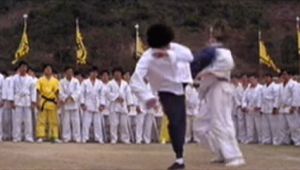For some it was dictated by fate. A huge flop, a life cut short, a change of direction. For others it was self-imposed. They had expressed everything they wanted to say and quickly moved on. Whatever the reason, there are directors out there with only a single movie credit to their name. A sole lonely entry on IMDB, and usually there’s a story behind their singular achievement. Here are ten of the finest…
Charles Laughton – Night of the Hunter
How could anyone not like Night of the Hunter? Not only that, how could EVERYONE not like Night of the Hunter. It’s just so incredible. It looks incredible, the performances are breathtaking, it’s completely unique. Amazing that a thespy Yorkshire lad could create this garish, expressionistic Southern gothic with a brilliantly crazy turn by a terrifying Robert Mitchum. But back in 1955, it received a collective thumbs down from critics and audiences alike.
More...
The Many Faces Of Will Ferrell
Five Unsung Prison Movies It’s Worth Enduring Solitary To See
Gly, no one liked it. Actor turned director Charles Laughton was never allowed or was too heartbroken to never make another film and was quickly established as the poster boy for ‘one-shot directors’. A tragedy.
Marlon Brando - One-Eyed Jacks
Another actor turned director, but this one had to crawl over the recently fired bodies of Sam Peckinpah and Stanley Kubrick to get his shot. It feels like a bit of a mash-up, the brooding psychological method acting antics of Brando shoehorned into a lusty romantic western. It had a wildly troubled pre-production process, until Brando decided to take over the whole shebang. But eventually Brando bored of the editing workload (he shot 5 extra hours of footage that he later destroyed) and it was handed to a variety of Hollywood hacks. The resulting film, released in 1961, got mixed, often baffled, reviews, though it is now well regarded. I’ll assume Brando hated directing (and editing) as much as acting, as he never tried it again.
Jean Genet – Chant D’Amour
Playwright, novelist and all around trouble-maker, Jean Genet was no stranger to prison, spending much of his early life in and out of institutions, His experiences in stir coloured much of his prose and poetry, so it’s no surprise that his only venture into filmmaking was this 25 minute short exploring penal love, passion and power amongst men. It’s fairly filthy and was instantly banned on release in 1950, with New York film legend Jonas Mekas beaten up and imprisoned when he smuggled a print into the States (using Harold Pinter, who he had met on the plane, as a decoy). Genet later disowned the film, with his biographer Edmund White suggesting that he was ashamed that someone with such high cinematic ambitions, as Genet was, blew his wad with this 25 minute short and never tried again..
Kerry Conran - Sky Captain and the World of Tomorrow
The first rule of Hollywood, corroborated by every book on screenwriting I’ve ever read, is don’t be an asshole. Crazy drug-fuelled mavericks were great back in the 1970s, now everyone would prefer a quiet life. And being considered an asshole takes on many forms. You don’t have to be naked and firing a shotgun from the roof of your trailer, just not playing the game can brand you as trouble. Did the major studios take offence that Kerry Conran managed to put together this 2004 film himself, making his own short version and raising the money from external sources? It’s just one theory as to why his credit list has remained untroubled since Sky Captain came out. Even though the film was well received and featured many innovative special effect techniques, he’s yet to release anything else. The fact that it didn’t make any money may also have had something to do with it.
Herk Harvey – Carnival of Souls
It’s unfair to brand Harvey as a one shot director as he was responsible for dozens and dozens of films. But he had two things going against him. He lived and worked in Lawrence, Kansas and he made industrial and educational films for the scary sounding Centron Corporation. His one credited feature is the excellent Carnival of Souls, which today is considered worthy of a Criterion DVD release, but back in 1962 was shunned as a goofy B picture. It’s a shame that no one could recognise the exceptional vision of this filmmaker and throw money at him to make many more atmospheric horror beauties
Barbara Loden – Wanda
Such a beautiful movie, slightly forgotten now, which is baffling as it exudes the best of Cassavettes-style 70s vérité filmmaking with European (particularly Bresson) influences. This fairly simple tale, a melancholy reaction to the bravado of Bonnie and Clyde, deals with a woman ambling through life, meeting a petty criminal and drifting along with him until it all goes awry. There weren’t many films at that time written, directed and starring a woman and sadly there weren’t any more by Loden. A Tony award winning actress, she wanted to remain independent and make more Wandas on her terms. But that desire was not shared by those who were in a position to finance her
Gilles Mimouni – L’appartment
Sometimes a massive flop or a critical mauling can curtail a director’s career. But that isn’t the case with Gilles Mimouni. He is more of a mystery. His amazing French thriller from 1996 L’appartment, has Christopher Nolan levels of visual swish and intelligent scripting. It seemed the dream debut. But then… nothing. There was a humdrum American remake, Wicker Park, with Mimouni credited as Executive Producer. But that’s it, in cinematic terms anyway. He finally re-emerged in 2011 with a quickly forgotten TV movie, but his early promise still remains unfulfilled.
Dalton Trumbo – Johnny Got His Gun
No surprise that people weren’t lining up to give Dalton Trumbo the cash to make movies. Despite being one of the finest American screenwriters ever, the taint of communism and the McCarthy blacklist ensured he couldn’t even write movies under his own name. He was only recognised as the true author of Roman Holiday in 1993, nearly 20 years after his death, and a posthumous Oscar was awarded to him. He’d written his incredibly bleak World War 1 novel, Johnny Got His Gun, in 1938 but had to wait until 1971 to make a film version.
Though grim, telling the story of a limbless blind and death war victim, it still packs a punch and huge chunks of it were later used in Metallica’s ‘One’ video. Though Trumbo never directed again, thanks to his incredible writing ability his position in cinema history is assured.
Leonard Kastle – The Honeymoon Killers
Not only did Kastle have the gumption to step in at the last second to save a troubled production, he replaced a fledgling Martin Scorsese in the process and made something still beloved today. Leonard Kastle was an opera composer asked by a producer friend to research and write a screenplay based on the true story of the ‘Lonely Hearts Killers’, a couple who conned and murdered lovelorn folks they met in the classified ads.
Kastle studied screenplays by Truffaut and Fellini and gave it his best shot. The script was handed to Scorsese, who in 1970 was fresh from making Who’s That Knocking at my Door? But when it became obvious that Marty was a budget-destroying perfectionist, he was fired and Leonard took over, creating a brilliant, eerie, sometimes hilarious film. Despite great reviews, no one went to see it and Kastle returned to operas and teaching. Other screenplays were written by him but nobody cared. As the man himself stated, ‘at least I never made a bad film after Honeymoon Killers’
James William Guercio – Electra Glide in Blue
While some on this list may be considered critical ‘failures’, that isn’t something that could be levelled at the amazing James Guerico. An enormously successful songwriter, record producer, cattle-rancher and coalbed methane prospector, he seemed to be exceptional in every venture he attempted. After working with Zappa, Chicago, Blood Sweat and Tears and the incredible Moondog, he decided to have a crack at movie-making. He wrote, produced and directed Electra Glide in Blue, with Arizona motorcycle cops beating up hippies and each other.
Guerico waived his own fee in order to hire legendary cinematographer Conrad Hall, though the two immediately clashed over the look of the film. It premiered at Cannes where, sadly, the fickle French crowd weren’t quite ready for a film where you’re expected to sympathise with cops and roundly booed it. Home-grown reviews weren’t much better, though the film is now well-regarded as the twisted 70s modern western that Guerico wanted to achieve.



